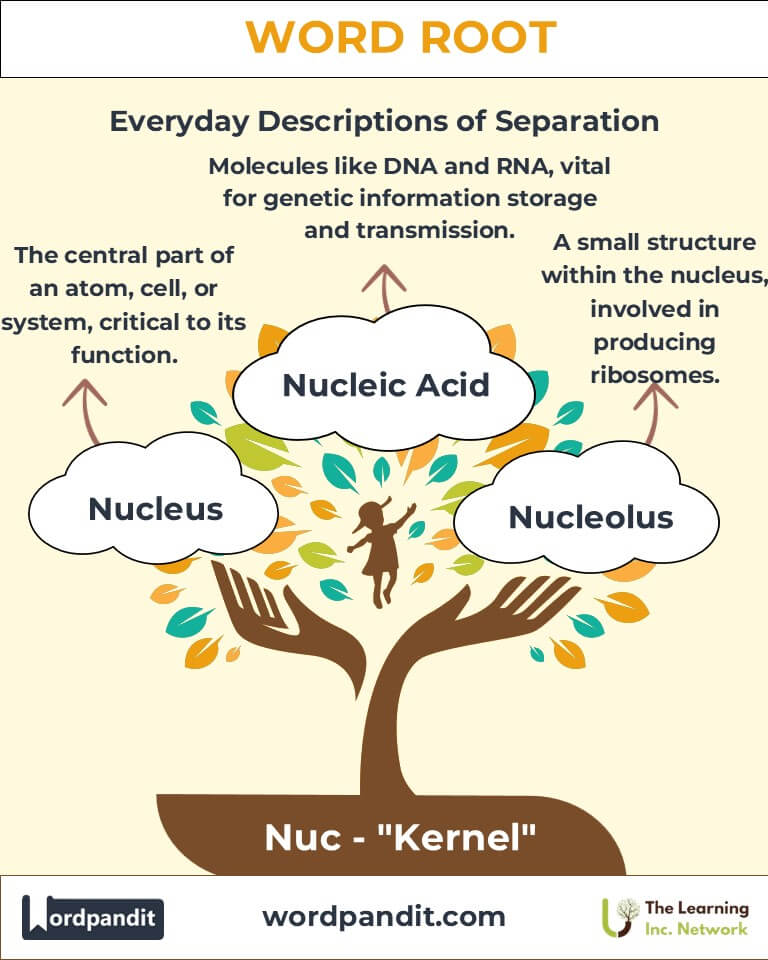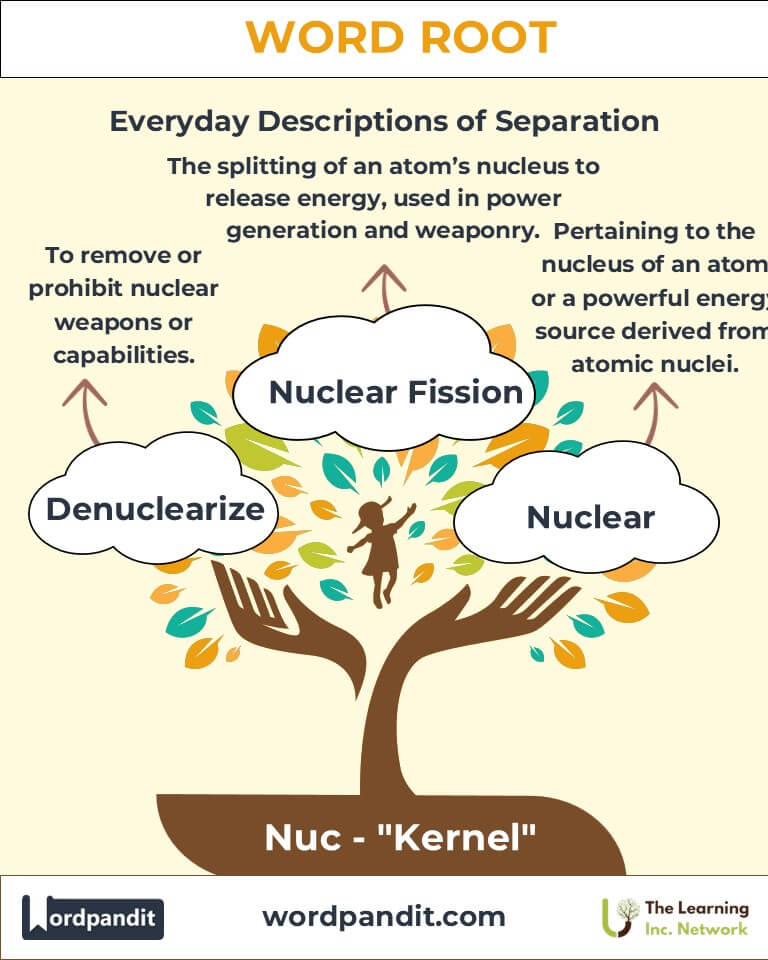Nuc: The Core of Knowledge in Science and Language
Dive into the world of "Nuc," a root derived from Latin, meaning "kernel" or "core." It forms the backbone of terms like "nucleus" and "nuclear," essential in science, technology, and everyday discourse. This versatile root symbolizes centrality and significance, shaping our understanding of structures and systems.

Table of Contents
- Introduction: The Essence of "Nuc"
- Etymology and Historical Journey
- Mnemonic: Unlocking the Power of "Nuc"
- Common "Nuc"-Related Terms
- "Nuc" Through Time
- "Nuc" in Specialized Fields
- Illustrative Story: "Nuc" in Action
- Cultural Significance of the "Nuc" Root
- The "Nuc" Family Tree
- FAQs About the Nuc Word Root
- Test Your Knowledge: Nuc Word Root Quiz
- Conclusion: The Living Legacy of "Nuc"

Introduction: The Essence of "Nuc"
Imagine peeling an orange to reveal its innermost seeds—the core, or "kernel," where growth begins. This metaphor mirrors the role of "Nuc" in language and science. Originating from the Latin word nucleus, meaning "kernel," "Nuc" represents the central element of structures, whether in atomic physics, biology, or abstract systems. From "nuclear energy" to the "nucleus of a cell," this root is vital across fields.
Etymology and Historical Journey
The root "Nuc" stems from the Latin nux, meaning "nut," later evolving into nucleus, or "little nut," to describe the seed of a fruit. Its application expanded in the 17th century, when scientist Robert Hooke used "nucleus" to describe the core of a cell. By the 20th century, physicists adopted the term to refer to the dense center of an atom, solidifying its place in scientific lexicons.
Mnemonic: Unlocking the Power of "Nuc"
Picture a walnut, its hard shell protecting the edible core or "kernel." This central part, crucial for sustenance, embodies the meaning of "Nuc."
Mnemonic Device:
"Nuc is the nut's nucleus, at the core of all growth and energy."
Common "Nuc"-Related Terms
- Nuclear (noo-klee-er): Pertaining to the nucleus of an atom or a powerful energy source derived from atomic nuclei.
Example: "Nuclear energy has transformed the global energy landscape." - Nucleus (noo-klee-us): The central part of an atom, cell, or system, critical to its function.
Example: "The cell's nucleus contains its genetic material." - Nucleolus (noo-klee-oh-lus): A small structure within the nucleus, involved in producing ribosomes.
Example: "Under a microscope, the nucleolus is visible as a dark spot in the nucleus." - Nucleic Acid (noo-klee-ik as-id): Molecules like DNA and RNA, vital for genetic information storage and transmission.
Example: "Nucleic acids are the blueprint of life." - Denuclearize (dee-noo-klee-er-ize): To remove or prohibit nuclear weapons or capabilities.
Example: "The treaty aimed to denuclearize the region."
"Nuc" Through Time
- Nucleus in Biology: First used to describe the core of a cell in the 1600s, the term reflected its role in containing genetic instructions.
Example: Advances in microscopy confirmed the nucleus as the control center of cells. - Nuclear in Physics: The 20th century saw "nuclear" redefine energy and warfare with the discovery of atomic fission.
Example: "Nuclear power plants generate energy through controlled reactions."
"Nuc" in Specialized Fields
- Biology:
Nucleus: Central organelle in cells.
Relevance: Crucial for genetic information storage and regulation. - Physics:
Nuclear Fission: Splitting of an atom's nucleus to release energy.
Application: Used in power generation and weaponry. - Medicine:
Nucleic Acids: Central to understanding genetic diseases.
Impact: Pioneering treatments in genetic engineering. - Politics:
Denuclearization: Central to global disarmament policies.
Significance: Ensures peace and reduces nuclear threats.
Illustrative Story: "Nuc" in Action
Dr. Elena Ramos, a biophysicist, spent years studying nuclear reactions to develop safer energy alternatives. During her research, she discovered a new method to stabilize atomic nuclei, reducing harmful radiation. Her breakthrough not only advanced nuclear safety but also emphasized the nucleus’s duality—capable of destruction or innovation, depending on its use.
Cultural Significance of the "Nuc" Root
The "Nuc" root is a metaphor for centrality and significance. In ancient philosophy, the "kernel" symbolized the essence of ideas, much like the nucleus represents the core of physical and biological systems today. From debates on nuclear energy’s risks to the cell nucleus’s role in life sciences, "Nuc" influences both societal discourse and scientific advancements.

The "Nuc" Family Tree
- Core Roots:
- Kary- (Greek: "nut, kernel")
Example: Karyotype (chromosome structure).
- Kary- (Greek: "nut, kernel")
- Related Suffixes:
- -cleus: Indicates centrality (e.g., nucleus).
- -ic: Relates to properties (e.g., nucleic).
- Associated Terms:
- Atom-: Smallest unit of matter.
Example: Atomic nucleus.
- Atom-: Smallest unit of matter.

FAQs About the Nuc Word Root
Q: What does "Nuc" mean?
A: "Nuc" means "kernel" or "core," derived from the Latin word nucleus, which referred to the inner seed of a nut. Over time, it became a metaphor for the central or most essential part of systems in both biology and physics.
Q: How does the term "Nucleus" differ in biology and physics?
A: In biology, the nucleus refers to the organelle within a cell that stores genetic material (DNA) and controls cellular activities. In physics, the nucleus refers to the dense, positively charged core of an atom, consisting of protons and neutrons. Both uses emphasize centrality and control.
Q: What is denuclearization, and why is it important?
A: Denuclearization is the process of removing or prohibiting nuclear weapons or energy capabilities, usually to ensure peace and global security. It plays a critical role in international diplomacy and disarmament agreements, aiming to reduce the threat of nuclear conflicts.
Q: What are nucleic acids, and why are they important?
A: Nucleic acids, such as DNA (deoxyribonucleic acid) and RNA (ribonucleic acid), are molecules that store and transmit genetic information in living organisms. They are vital for encoding the instructions needed for the growth, development, and reproduction of all life forms.
Q: Why is the nucleus often considered the "control center" of a cell?
A: The nucleus houses the cell’s genetic material (DNA) and regulates gene expression, determining which proteins are produced. This control function makes it akin to a command center that directs the cell's activities and ensures its proper functioning.
Q: How does nuclear energy work, and why is it controversial?
A: Nuclear energy is produced by splitting the nucleus of an atom (nuclear fission) or combining nuclei (nuclear fusion). While it generates large amounts of energy with low greenhouse gas emissions, concerns about radioactive waste, potential accidents, and weaponization make it a topic of debate.
Q: Can the word "nucleus" be used metaphorically?
A: Yes, "nucleus" is often used metaphorically to describe the central or most important part of a system or group. For example, "The committee served as the nucleus of the reform movement," highlighting its core role.
Test Your Knowledge: Nuc Word Root Quiz
1. What does "Nuc" mean?
2. Which term refers to the control center of a cell?
3. How is nuclear energy generated?
4. What is the function of nucleic acids?
5. What is denuclearization aimed at achieving?
Conclusion: The Living Legacy of "Nuc"
The root "Nuc" symbolizes centrality and power, both in language and scientific discovery. Its application spans biology, physics, and beyond, reflecting humanity's quest to understand and harness the core of systems. As we advance, "Nuc" continues to shape the narrative of innovation, reminding us of the significance of exploring what lies at the core.














